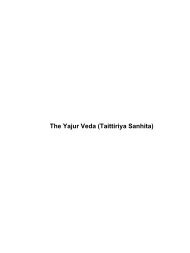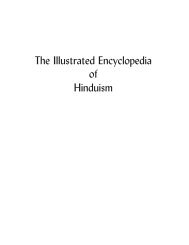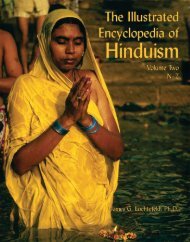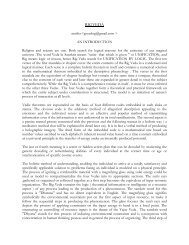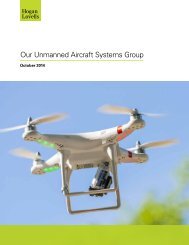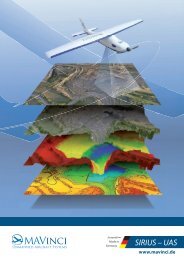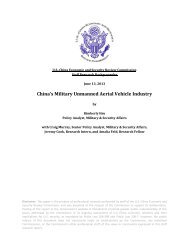A Concise Encyclopedia of Hinduism Klaus K Klostermaie
You also want an ePaper? Increase the reach of your titles
YUMPU automatically turns print PDFs into web optimized ePapers that Google loves.
61 Durgä<br />
donkey<br />
An animal that was not considered fit for<br />
Vedic sacrifice because it lacked MEDHA.<br />
Draupadï<br />
Daughter <strong>of</strong> King Drupada and wife <strong>of</strong><br />
the five Päæõava brothers. A major figure<br />
in the MAHÄBHÄRÄTA. Her humiliation<br />
by the KAURAVAS eventually<br />
brought about the great war.<br />
Dräviõa (1)<br />
South India, where Dravidian (non-<br />
Sanskritic) languages are spoken<br />
(Tamil, Tulu, Telugu, Malayalam) and<br />
everything connected with it.<br />
Dräviõa (2)<br />
South Indian style <strong>of</strong> architecture.<br />
Durgä (‘difficult <strong>of</strong> access’)<br />
A name <strong>of</strong> the Goddess (DEVÏ), especially<br />
in her fierce form. Seen either as one<br />
<strong>of</strong> the forms <strong>of</strong> PÄRVATÏ, the consort <strong>of</strong><br />
Ÿiva, or as the combined ŸAKTI <strong>of</strong> all the<br />
deities, she is one <strong>of</strong> the major figures in<br />
the Hindu pantheon. In her role as<br />
Mahi•amärdiæï (slayer <strong>of</strong> the buffalo<br />
demon), Durgä is honoured every year<br />
during Durgäpüjä as the saviour <strong>of</strong> the<br />
world from evil. Durgä celebrations are<br />
especially elaborate in Bengal, where<br />
her images are set up in homes and public<br />
places and worshipped for a period<br />
<strong>of</strong> nine days (Navarätrï).<br />
Arjuna has a vision <strong>of</strong> Durgä the<br />
night before the battle and invokes her<br />
at the beginning <strong>of</strong> the Great War. The<br />
major text dealing with Durgä is the<br />
Devïmähätmya <strong>of</strong> the MÄRKAŒ¥EYA<br />
PURÄŒA.<br />
Dräviõa Prabandham<br />
Collection <strong>of</strong> (Tamil) hymns composed<br />
by the Ä®VÄRS, especially by<br />
NAMMÄ®VÄR, undertaken by NÄfiHA<br />
MUNÏ and considered on par with the<br />
VEDA in worship; the ‘Tamil Veda’.<br />
Drona (‘bucket’)<br />
A brahmin who according to legend<br />
was generated by his father,<br />
BHÄRADVÄJA, in a bucket. He was the<br />
teacher <strong>of</strong> military arts to both the<br />
PÄŒ¥AVAS and the KAURAVAS. In the<br />
Great War he sided with the Kauravas<br />
and, in spite <strong>of</strong> being a brahmin,<br />
became commander-in-chief after<br />
Bhï•ma’s death. He was killed by<br />
Dø•fladyumna, Drupada’s son, whom<br />
Drona had slain earlier in battle. (See<br />
also Mahäbhärata.)<br />
Dø•advatï<br />
River referred to in the Øgveda, constituting<br />
the eastern and southern border<br />
<strong>of</strong> BRAHMÄVARTA.<br />
The goddess Durgä riding on her<br />
vahana (vehicle), the lion.




